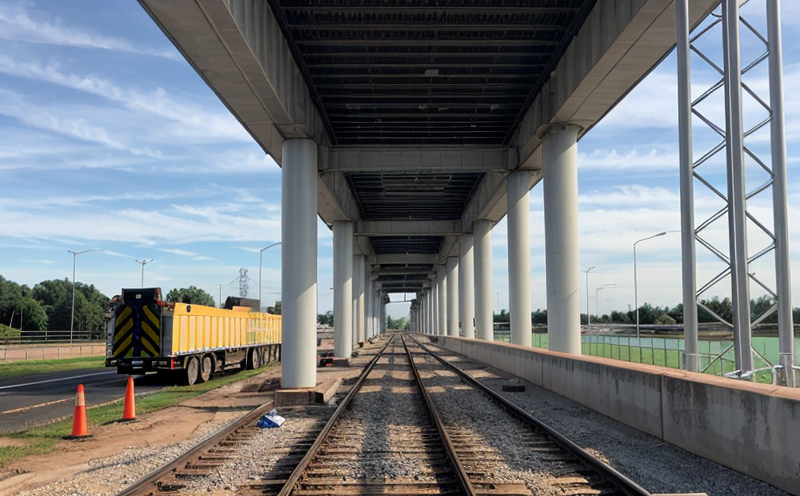ISO 13824 Dynamic Testing of Road Structures
The ISO 13824 standard provides a comprehensive framework for conducting dynamic testing on road structures, which is critical for assessing the durability and integrity of these infrastructure assets. This testing method evaluates how road surfaces respond to moving loads under various conditions, ensuring they meet specified performance criteria over their operational lifespan.
Dynamic testing involves measuring the deflection or deformation of road surfaces when subjected to dynamic loading. This process helps identify potential weaknesses such as cracks, unevenness, or areas prone to failure. By understanding these factors early in a structure's life cycle, maintenance and repair can be optimized, extending the useful life of roads while reducing costs associated with premature replacement.
One key aspect of ISO 13824 testing is the use of specialized equipment designed to simulate real-world traffic conditions. This includes portable impact testers capable of generating controlled impacts at specific speeds and angles. The data collected from these tests provides detailed insights into the behavior of different road materials under stress, allowing engineers to make informed decisions about future maintenance schedules or material selection.
In addition to laboratory simulations, field testing plays a crucial role in validating findings obtained through controlled environments. Field tests allow for comprehensive evaluation across diverse environmental conditions, including temperature fluctuations and varying humidity levels. These outdoor assessments complement indoor trials by providing broader context regarding the long-term performance of road structures under realistic operating parameters.
The results from ISO 13824 dynamic tests are used to determine compliance with relevant standards and guidelines set forth by governing bodies worldwide. Compliance ensures that roads are safe for public use while also meeting sustainability goals related to resource efficiency and environmental impact reduction. Furthermore, successful completion of these tests can enhance a project’s reputation among stakeholders, including clients, investors, and regulatory authorities.
Understanding the nuances involved in executing ISO 13824 dynamic testing requires expertise not only in technical aspects but also in interpreting results accurately. Our team at Eurolab is well-equipped to handle all stages of this process, from initial consultation through final analysis and reporting. With years of experience working with various types of infrastructure projects, we bring a wealth of knowledge to each assignment.
Our approach begins by thoroughly reviewing your specific requirements against applicable standards like ISO 13824. This ensures that our testing protocols align precisely with what you need to achieve your goals. Once approved, we proceed to select appropriate equipment and prepare specimens according to best practices outlined in the standard.
The actual test phase involves careful calibration of instruments followed by rigorous application of dynamic loads on representative samples taken from existing road surfaces or newly constructed ones. Throughout this process, continuous monitoring ensures accurate data collection even as conditions change dynamically during testing. After completing each series of tests, our analysts meticulously analyze all collected information using advanced software tools to generate detailed reports tailored specifically for your needs.
These reports serve multiple purposes beyond mere documentation; they provide actionable insights that can guide future planning and execution efforts. For instance, if certain areas show signs of early deterioration despite meeting current standards, recommendations might include implementing enhanced preventative measures or adjusting maintenance schedules accordingly.
By leveraging ISO 13824 dynamic testing, you gain valuable perspectives on how your road structures perform under real-world conditions. This knowledge empowers you to make strategic decisions that balance safety, durability, and cost-effectiveness throughout the lifecycle of each project. At Eurolab, we pride ourselves on delivering exceptional service backed by robust technical capabilities and unwavering commitment to quality.
Scope and Methodology
The scope of ISO 13824 dynamic testing encompasses a wide range of road structures, from highways and urban roads to rural pathways. The methodology involves several key steps aimed at ensuring accurate and reliable results:
- Preparation: Specimens are carefully prepared according to specified dimensions and specifications outlined in the standard.
- Loading: Controlled dynamic loads are applied using portable impact testers capable of simulating real-world traffic conditions.
- Data Collection: Continuous monitoring during testing ensures accurate measurement of various parameters such as deflection, strain, and stress.
- Analysis: Collected data is analyzed using advanced software tools to generate detailed reports that highlight key findings.
Eurolab Advantages
At Eurolab, we understand the importance of precision and reliability in infrastructure testing. Our advantages lie in our comprehensive suite of services tailored specifically for ISO 13824 dynamic testing:
- Experienced Professionals: Our team comprises highly qualified engineers with extensive experience working on diverse infrastructure projects.
- Cutting-Edge Equipment: We utilize state-of-the-art equipment capable of delivering precise measurements and accurate data collection.
- Comprehensive Reporting: Detailed reports are provided that offer not only factual observations but also actionable recommendations to enhance future projects.
- Rigorous Quality Assurance: We adhere strictly to international standards, ensuring every test meets the highest quality benchmarks.
International Acceptance and Recognition
The ISO 13824 standard enjoys widespread recognition across numerous countries due to its rigorous approach towards evaluating road structures. Many nations have incorporated this standard into their national codes, making compliance essential for international projects.
Recognizing the importance of consistent testing methodologies worldwide, organizations like ASTM and EN have also referenced ISO 13824 in their own standards. This cross-referencing underscores the global acceptance and relevance of this dynamic testing protocol.
By adhering to ISO 13824 guidelines, you ensure that your road structures meet stringent international benchmarks, thereby enhancing credibility both domestically and internationally. Furthermore, successful completion of these tests can open doors to new markets and collaborations with global partners.





